Key points from article :
Researchers at University of Southern California studied the genetic basis of biological aging (BAG) across nine organ systems in over 377,000 participants from the UK Biobank.
They found that while each organ system had unique genetic markers influencing its aging process, there were also interconnected genetic effects across multiple organ systems.
Lifestyle factors like sleep duration and body weight, along with chronic diseases like diabetes and Alzheimer's, were found to have potential causal links to the aging of these organ systems.
The brain's role in maintaining the body's balance (homeostasis) likely explains its interconnectedness with the health of other organs.
The study also highlighted a two-way relationship between the aging of the musculoskeletal system (bones and muscles) and the liver, suggesting their interconnected roles in metabolic health.
Published in Nature Aging, this research suggests a holistic approach to understanding complex diseases, emphasizing the interconnectedness of organ systems and the impact of lifestyle factors on aging.







